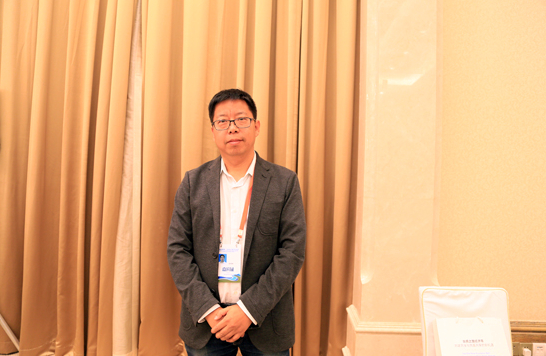Silk Road Economic Belt differs from Eurasian Union
- By Zhang Lulu
 0 Comment(s)
0 Comment(s) Print
Print E-mail China.org.cn, June 30, 2014
E-mail China.org.cn, June 30, 2014
|
|
|
Xu Poling, the executive director of the Research Center for the Economies and Politics of Transitional Countries at Liaoning University, in an interview with China.org.cn on the sidelines of the roundtable at the Silk Road Economic Belt International Seminar held in Urumqi, capital city of the Xinjiang Uygur Autonomous Region, on June 27. [China.org.cn/Zhang Lulu] |
The Silk Road Economic Belt is inclusive and therefore completely different from the Eurasian Union, said Xu Poling, the executive director of the Research Center for the Economies and Politics of Transitional Countries of Liaoning University, at an international seminar on the Silk Road Economic Belt.
Chinese President Xi Jinping put forward the initiative to build the Silk Road Economic Belt during his visit to Kazakhstan in September, while the Eurasian Economic Union proposed by Russia is set to go into effect starting in 2015. As both involve central Asia, some analysts have argued that some conflicts of interest may arise in this region.
"The focus of the Silk Road Economic Belt lies in central Asia, which has always been the ‘backyard' of Russia," Professor Xu Poling told China.org.cn on the sidelines of the roundtable discussion at the Silk Road Economic Belt International Seminar, which was held in Urumqi, capital city of the Xinjiang Uygur Autonomous Region, from June 26 to 27. "Though Russia slackened its control over the region for some time after the collapse of the USSR, central Asia became the focal point again when Putin came to throne in 2000. Russians reacted strongly after China proposed the initiative of building the Silk Road Economic Belt, as some suspected that China was trying to drive Russia away in this region or take the place of Russia.
"In fact, the Silk Road Economic Belt and the Eurasian Union are two completely different things. The Silk Road Economic Belt, as many have said at today's roundtables, is an inclusive and open initiative intended for common development. It does not rule out other countries, but is aimed at cooperating with other countries to develop and prosper together," Xu continued. "Russia's Eurasian economic integration is quite different. It is a closed system that rejects other countries' influence. From the Customs Union of Belarus, Kazakhstan and Russia to the Eurasian Economic Union and even the Eurasian Union, it is intended to build a supranational union, which involves transfer of sovereignty. It is like the European Union or the North American Free Trade Area or the Association of Southeast Asian Nations, and totally different from the Silk Road Economic Belt."
However, there are signs that Russia is showing an understanding for and even some willingness to cooperate in China's initiative, Xu said.
For example, China and Russia issued a joint statement during the Conference on Interaction and Confidence-Building Measures in Asia in May. China expressed its willingness to take into account Russia's interests when building the Silk Road Economic Belt, and Russia praised China's initiative as being vitally important.
Despite this, how the two countries will make collaborative efforts remains a question. For example, if China builds some sort of free trade area to substantiate the Silk Road Economic Belt, it will become a gateway to the Eurasia and thus disrupt the exclusiveness of the Eurasian Union, Xu said.
"China probably should not carry out an all-round cooperation at first, but start with some particular projects that will improve the employment opportunities and living standards in this region," Xu said. "For example, China can help Kyrgyzstan to develop its pillar industry, the textile industry, to provide it with advanced equipment in order to elevate the production efficiency and build it into the world's best textile base. Then, it will play an exemplary role and help diffuse the doubt in the region."







Go to Forum >>0 Comment(s)